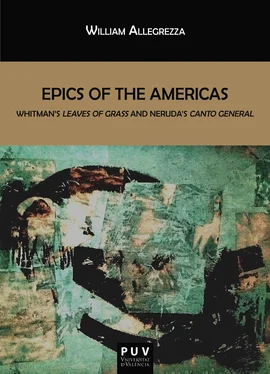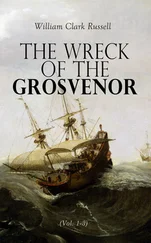William Allegrezza - Epics of the Americas
Здесь есть возможность читать онлайн «William Allegrezza - Epics of the Americas» — ознакомительный отрывок электронной книги совершенно бесплатно, а после прочтения отрывка купить полную версию. В некоторых случаях можно слушать аудио, скачать через торрент в формате fb2 и присутствует краткое содержание. Жанр: unrecognised, на английском языке. Описание произведения, (предисловие) а так же отзывы посетителей доступны на портале библиотеки ЛибКат.
- Название:Epics of the Americas
- Автор:
- Жанр:
- Год:неизвестен
- ISBN:нет данных
- Рейтинг книги:3 / 5. Голосов: 1
-
Избранное:Добавить в избранное
- Отзывы:
-
Ваша оценка:
- 60
- 1
- 2
- 3
- 4
- 5
Epics of the Americas: краткое содержание, описание и аннотация
Предлагаем к чтению аннотацию, описание, краткое содержание или предисловие (зависит от того, что написал сам автор книги «Epics of the Americas»). Если вы не нашли необходимую информацию о книге — напишите в комментариях, мы постараемся отыскать её.
Epics of the Americas — читать онлайн ознакомительный отрывок
Ниже представлен текст книги, разбитый по страницам. Система сохранения места последней прочитанной страницы, позволяет с удобством читать онлайн бесплатно книгу «Epics of the Americas», без необходимости каждый раз заново искать на чём Вы остановились. Поставьте закладку, и сможете в любой момент перейти на страницу, на которой закончили чтение.
Интервал:
Закладка:
An epic tradition in Latin America traces to Alonso de Ercilla’s La araucana ( The Arucanadid ), which describes Chile’s conquest. Pablo Neruda often stated that Latin America was created by poets, and it is Ercilla to whom he credits this creation. True to the spirit of later Latin American epic writers, Ercilla in La araucana expresses dismay at his fellow countrymen’s greed during the conquest. The poem concerns events in progress and is told by a poet who is the main character; moreover, there is no single hero but rather a number of heroes. Yet Ercilla’s work does not fulfill the function of an epic of the Americas as imagined by later poets, partially due to its regional approach and partially due to its scope, but it does provide a paradigm for later poets, some of whom invoke Ercilla’s name since he provides a paternal figure for a Latin American tradition—he provides an image of a poet who can be called Latin American instead of European. Even so, other attempts at Latin American epic were not made until much later by writers like Andrés Bello, José de Alencar, Gonçalves Dias, Ruben Dario, and Jose Santos Chocano.
As with Ercilla, when Andrés Bello took up the task, he chose the epic for its foundational qualities. Seeing the Americas as a land yet without culture, Andrés Bello worked in the early part of the nineteenth century to address this problem. His solution lay in creating an epic work, which he tried and failed to do. In his epic attempt “Alocucíon” (“Address”), he calls on the spirit of poetry to leave the tired continent of Europe for the fresh, teeming landscape of the New World:
Divina Poesía,
tú de la soledad habitadora,
a consultar tus cantos enseñada
con el silencio de la selva umbía,
tú a quien la verde gruta fue morada,
y el eco de lose monted compañía;
tiempo es que dejes ya la culta Europa,
que tu native rustiquez desama,
y dirijas el vuelo adonde te abre
el mundo de Colón su grande escena. (1-10)
Divine Poetry,
you who dwell in solitude
and wrap your songs
in the silence of the shaded forest;
you who lived in the green grotto,
the mountain echoes your company.
Time it is to abandon Europe,
no lover of your native rusticity,
and turn your fancy to the great setting
unveiled by the new world. 3
His desire is unlike later Latin American writers in that he invites the goddess of poetry to come to the New World. For Bello, the spirit of poetry is rustic as the Americas are rustic, and he intends to readjust this rustic nature of the Americas through poetry, yet it is also this same rustic sense that allows poetry a home in the New World. Bello doesn’t ask for a new tradition of poetry in the Americas, a poetry grounded in the people, as later writers demand. He asks for the inspiration for an American Virgil, for a poet who can sing the founding of a new empire of the American republics. While Bello’s poem has often been taken as a claim of Latin American intellectual independence, it is, as Antonio Cussen argues, highly classical, not only in its epic invocation but also in its desire to provide a new extension of Western culture (100). The poem is an attempt to lift the poetry of the Americas to the level of European poetry; thus, it is an attempt to show that the Americas can start a poetic tradition worthy of the future, and yet the poem relies heavily on the past. Moreover, this reliance on the past is what differentiates attempts at the epic in Latin America and the United States. In general, Latin American writers feel the sense of having a textual past in a way that Anglo American writers do not. As stated earlier, Neruda claimed that Latin America was created by writers, a claim that does not resonate in Anglo America. In Anglo America the idea of immanence is more prevalent than textuality—this idea finds expression in the works of most of the Transcendentalists. Important early Anglo American writers stress their own experience in the present without referencing to the authority of past texts. In other words, their presence in the now is more authoritative than past texts. Henry David Thoreau expresses this sentiment often in Walden . In contrast, Bello believes that Americas are without culture, but he believes that American texts, once written, can take place in the constellation of European texts.
Latin American Modernists attempted American epics, yet no work came close to achieving the task until Pablo Neruda’s Canto general , and when Neruda attempts the epic, he is aware of Latin American examples, but he uses Whitman’s work as a working model. It suffices to say here that Latin American poets felt a need for an Pan-American culture just as much as did thinkers like Simón Bolivar and José Enrique Rodó. 4 Poets like Rubén Darío imagined themselves as more than just citizens of one country, even if the political reality lagged behind the cultural reality. In attempting the epic, Latin American writers were searching for a myth that would tie together Latin America, much in the way that the states are tied together in the United States. In other words, through language Latin American poets were attempting to forge a link throughout Latin America that their politics did not provide.
While the poetic tradition of the American epic is continuous in Latin America, the tradition is more pronounced in the United States. 5 In 1807 Joel Barlow made the first attempt in his Columbiad , a work that traces the visions granted to Columbus of the Americas. The poem, like later poetic attempts, is highly self-conscious. Right from the beginning Barlow evokes its relation to European epics:
I sing the Mariner who first unfurl’d
An eastern banner o’er the western world
And taught mankind where future empires lay (1, 1-3)
His beginning, “I sing,” emulates the traditional openings of poets like Homer and Virgil. He first introduces the hero, and then advances on a tale of the progress of freedom in the Americas. Along the way he uses traditional epic devices, such as a focus on superhuman activities, catalogues, and epic couplets. Barlow tried to create an American epic to provide direction to American poetry and culture; however, his conception of the epic is similar to that of Bello; he relies heavily on European epics. Like Bello he assumes that the United States needs a native Virgil, not, as later poets claim, a new paradigm. That the Columbiad fails in creating an American epic was as critically accepted in its period as it is now. The traditional epic is not suited to the New World, as Bello’s and Barlow’s failed attempts show. Yet, Barlow’s Columbiad is important primarily in that it commenced the project in Anglo America for an American epic.
Читать дальшеИнтервал:
Закладка:
Похожие книги на «Epics of the Americas»
Представляем Вашему вниманию похожие книги на «Epics of the Americas» списком для выбора. Мы отобрали схожую по названию и смыслу литературу в надежде предоставить читателям больше вариантов отыскать новые, интересные, ещё непрочитанные произведения.
Обсуждение, отзывы о книге «Epics of the Americas» и просто собственные мнения читателей. Оставьте ваши комментарии, напишите, что Вы думаете о произведении, его смысле или главных героях. Укажите что конкретно понравилось, а что нет, и почему Вы так считаете.












